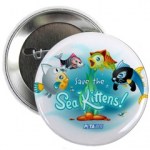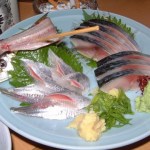Solutions
A neighborhood in Leicester, England had an entire YouTube channel dedicated to neighborhood issues, including catching "litter louts". As BoingBoing point out, this is a fine example of citizen surveillance. This case study also fits very nicely into our discussion of soft enforcement and sousveillence for conservation (it might also spawn a discussion about rights to privacy). The neighborhood has provided an email, and if someone knows the litterers in the videos they can email to alert the neighborhood management board.
Today (which, as happenstance would have it, also happens to be World Ocean Day) the environmental and conservation news site Mongabay.com ran an interview with me on why we should stop eating seafood. I think that if we can get people to feel about fish the way they feel about birds it should be easier to save them...
In some ways, [fish] are not that different from birds and, as anyone who has ever been to England knows, there is no shortage of sentiment for avian species. Fish often travel in flocks and flash beautiful colors. Like the albatross, tunas cover remarkable migratory distances…
Just as we have renamed fish to make them more marketable, there is a push in conservation (and science in general) to change certain uncommunicative terms to more lucid or dramatic ones. As an article in the NYTimes titled Seeking to Save the Earth, with a Thesaurus points out, it might be useful to replace "global warming" with "our deteriorating atmosphere", especially since conservationists (note: a shift from "environmentalists") are up against coal companies promising "clean, green coal".
In the same way the liberal party needed to begin using frames to manipulate public opinion (as…
As Mark Powell (of the Ocean Conservancy) pointed out in the comments of the last post, Roger Rufe of the Ocean Conservancy said that we need to "use ocean wilderness to lead a new way of thinking about and seeing our oceans through a positive conservation lens, rather than an extractive one." And also that "we must shift our focus from the oceans as fish warehouses and dumpsites and focus on them as natural ocean communities to be cherished and protected."
Agreed.
But this campaign disappeared and, according to Mark Powell, it was because people weren't ready for it. He rightly believes we…
A Guilt Trip for Obama
I sent a million emails
Cheering you on in every line.
I watched Will.I.Am's video
About a thousand times.
I stood strong against my parents
(Both McCain supporters).
I recruited my brother:
A first time and Obama voter.
I made inspirational cds,
Sending them to friends in every state.
I bought an Obama-sized cutout
And motored him 'cross the U.S.A.--
He was kicked out in Florida,
Photo-opped in Tennessee,
And adored by all in L.A.
Knowing you were a champ,
I customized a YES WE CAN stamp.
I posted on YouTube,
I read your news every day,
I wrote many rants,
I hoped and…
Hm. I have mixed feelings about this ultimate example of renaming fish. PETA has a new campaign out to get people to relate to fish as animals rather than as commodities, which is a noble goal and one I very much support. There are a few snags with their Save the Sea Kittens campaign, though.
First of all, fish are not domesticated like kittens (or like chickens! So I also have a hang up about tuna being dubbed "the chicken of the sea"). And I don't think renaming fish as kittens really enhances the mythology around fish (despite all the accessories). Rather, this new campaign might…
The New York Times blogpost The 11 Best Foods You Aren't Eating was one of the most-viewed stories for 2008 and guess what? One of those 11 foods were sardines*! One more reason to Eat Like A Pig!
*Note: I wanted to post a scrummy looking sardine in this post but check out what you get when you Google Image sardines. Not exactly appetizing. Chefs and your photographers: please send delicious-looking photos! [Thank you W.S. for sending this one along:]
We need to pay closer attention to how hunting and fishing regulations are set or we may end up with unintended negative consequences for the species we are trying to protect. This according to new research reported in The New York Times. We know that target species can react to increased predation by humans (which is far different from the type of predation that occurs in the wild, where predators prefer the young and dying). We saw this in the cod fishery when cod evolved to reproduce at younger ages and smaller sizes. Daniel Pauly, the father of shifting baselines, is also quoted in…
You know I appreciate a lot of the work Greenpeace does in the seafood market (for instance, chiding retailers and sabotaging seafood expos). This week, they've done it again. Greenpeace erected 'crime scenes' at 8 Loblaw grocery stores in Toronto with the message "caught red-handed selling Redlist fish." The following day, according to Intrafish news service, Loblaw officials were reportedly "disappointed" but said they would work to offer more MSC-certified fish.
Also, The Vancouver Sun reports this week that dogfish fishermen off the coast of British Columbia saying the market for…
In this month's issue of Wired Magazine, Andrew Curry writes about rewilding projects around the world. In particular, he describes the wonderful efforts going on in the Netherlands.
Economist Raghuran Rajan (past Chief Economist for the International Monetary Fund and Professor of Finance at University of Chicago) has an insightful view on the current financial crisis. He also asks what seems to be an important question that no one is asking: Why are we (the US Government) bailing out the system before the shareholders are asked to do so first? He argues that asking the shareholders to put up more capital to rescue the system should be the first thing to try. Government intervention is actually the third of three options.
Given that a $700 billion - $1 trillion bail out…
Secretary Paulson's plan revealed today is bold indeed, and sounds like socialism to me (banning short selling on some stocks and giving government backing to select others). Well, here is another bold plan for the North Atlantic Ocean. John Briggs of Oregon State University makes an argument that due to ecological history and overfishing, we should take a proactive strategy and start introducing fish species to the North Atlantic to increase biodiversity and production. This is certainly a risky and bold proposal, and likely a one-way street (unlike lions, reversing a fish introduction would…
Focusing on subsidies rather than consumers likely to be better for fish and for small-scale fishermen
A couple weeks ago, Daniel Pauly and I got the paper Funding Priorities: Big Barriers to Small-scale Fisheries published in the journal Conservation Biology. In our analysis, we try to demonstrate that conservationists attempts to encourage sustainable fisheries at the market level should place at least equal emphasis on eliminating harmful fisheries subsidies as on consumer-based approaches (e.g., wallet cards that advise on which fish to eat).
More emphasis on eliminating subsidies might…
In the recent issue of the journal Biological Invasions, my colleague Chris Wilcox and I published an essay entitled, Integrating invasive mammal eradications and biodiversity offsets for fisheries bycatch: conservation opportunities and challenges for seabirds and sea turtles. It expands on a previous paper we wrote in 2007 that makes an argument for biodiversity offsets in the fishing sector. The idea has turned out to be controversial to say the least, but that is not unexpected - new ideas are often so, and biodiversity offsets in general have been controversial in nature.
Here is how…
"Part of being on the road means the ability to live a little more luxuriously than at home, and that means not having to turn off the lights and the TV." Now, that is a good ole American quote. But, I wonder how many Americans live "a little more luxuriously" at home all the time as well.
Here's another one that in my experience is quintessentially American: "People say they want to be green, but they don't want to compromise."
Those quotes come from a NYT article on American hotels going "green", which could also be summed up as American hotels catching up with the rest of the developed…
Now this is exciting. T. Boone Pickens, chair of the Hedge Fund BP Capital Management, is throwing his money to the wind. Listen to an interview on NPR with ex-oilman Pickens and his new wind energy investment in Texas.
I just finished teaching a 200-level course on Marine Science at Western Washington University and this quarter, just as last quarter, I offered the students extra credit if they wrote a letter to their representative about an ocean issue and proposed solution to the problem that they learned about in class. The letters must come in an addressed, stamped, unsealed envelope and this year I received more than 40 of them, some of them stuffed with scientific studies we had read, many of them calling for more marine protected areas. It's a really rewarding assignment for them and for me. I'm…
Yesterday, Greenpeace-USA released a report criticizing supermarkets for buying unsustainable seafood. Greenpeace-Canada also released a similar report, which I spoke about this morning on CTV news. As I said in the interview, if we want sustainable seafood to become something more than just yuppie food, we're going to have to affect behavior on a big scale and supermarkets (where, in Canada, for instance, two-thirds of seafood is sold) are one medium for doing this. One way to motivate supermarkets to change their buying behavior is through affecting their reputation with negative…
Since we're on the subject of eating lower on the food web, check out this wonderful, solutions-oriented article on Putting Meat Back in Its Place by Mark Bittman for The New York Times (and its imaginative artwork)...
Taras Grescoe, author of Bottomfeeder: How to Eat Ethically in a World of Vanishing Seafood has a new article out in the New York Times on why we should opt for sardines over salmon. On the one hand, I disagree with Grescoe's overall premise that we can steer consumption to achieve a desirable outcome. Consumers alone cannot save our fish. On the other hand, I commend his efforts to raise awareness and support for eating lower on the marine food web. Check out his article and see what you think...



